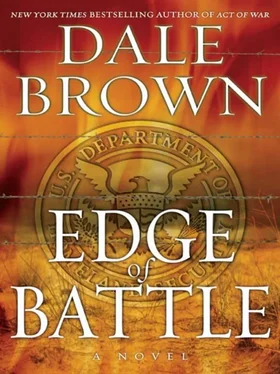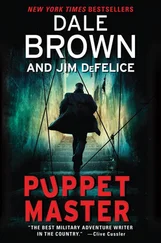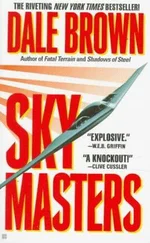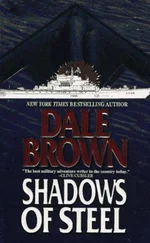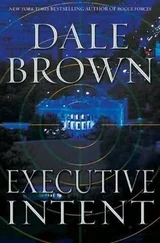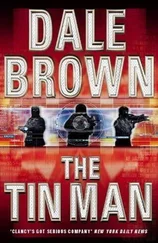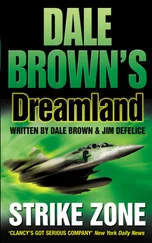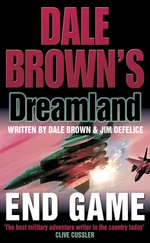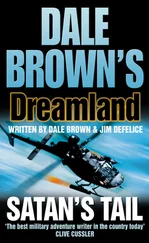When he reached the wide intersection across from his office building, he saw huge clusters of Hispanics crowding the intersections on all four corners—they didn’t seem violent, just loud—and their numbers, which seemed to grow by the minute, made them seem more intimidating. It took six light cycles to get through the largest group of people near the Green Valley Resort.
Another cell phone call: “Bob…?”
“I’m almost at the studio, Fand,” he said. “I don’t think I’ll have any trouble getting in. Looks like things are clearing out.” But as he approached the studio, located in a new office complex overlooking Green Valley, it was clear that Fand was not exaggerating and that things were not clearing out. A crowd of about two hundred people, mostly Hispanic but with a good number of non-Hispanics mixed in, chanted and shouted in front of the office building’s entrance, carrying picket signs and creating a loud din with a variety of noisemakers. There was a thin circle of police officers surrounding the crowd, and across the street were several TV station satellite trucks—O’Rourke recognized every local news station and a couple from as far away as Los Angeles and Phoenix.
He briefly considered going around back and parking in the fenced-off secure employee parking area, but there were only a dozen VIP parking areas in front, and his was one of them—he was not going to be denied the coveted spot. Besides, if he sneaked in the back way, none of these reporters and cameramen would know he was here—they might assume he was just going to play a prerecorded or repeat broadcast, and that would show he was afraid. Nuts to that. He headed for the entrance, which was obscured by protesters and a few police officers, trusting the sheer size of his big SUV would cause the protesters to let him pass.
He was stopped immediately by a City of Henderson police officer, wearing a motorcycle officer’s hard helmet, leather gloves, and knee-high black leather boots, plus a bulletproof vest under his uniform shirt. “Hello, Mr. O’Rourke. I wouldn’t recommend parking in front today, sir. The crowd’s testy and getting bigger by the minute.”
“I can see that, Sergeant,” O’Rourke said loudly. “If it’s not safe out here, I suggest you do something about that.”
It was obvious that the officer didn’t like being told what to do by a civilian, even a famous one. He leaned forward, putting his face closer to O’Rourke’s. “We’re in the process of clearing this crowd, sir, ” he said, spitting out the word “sir” for emphasis, “but in the meantime, so you won’t be delayed in getting inside, I strongly recommend you park somewhere else. Better yet, consider doing your broadcast from somewhere else entirely today. Sir.”
“I’m not leaving just because of these…these nutcases, ” O’Rourke said indignantly. “This is private property. Unless these people were invited here by the building owners—which I seriously doubt, because I am one of them—they are trespassing.”
“We’re trying to avoid an impromptu protest turning into a serious incident here, Mr. O’Rourke,” the officer said. “The sooner I can get this situation under control, the faster things will return to normal.”
“How do you propose to do that, Sergeant?”
“Once we identify the organizers, talk to them, and try to find out how long they plan on being out here…”
“You plan on talking to them all afternoon?”
“No, sir. But talking first gives me an opportunity to collect intelligence data, plan a response, and start moving our men and equipment to this location, Mr. O’Rourke. It takes time to decide which crowd control forces to bring in—more officers, mounted units, full riot control, or SWAT—and then get them moving out here. My job is to talk with the organizers, provide an initial assessment of the situation, and make a recommendation to the special operations commander. That’s what I was trying to do before you showed up. The more time we can buy without letting the situation get worse, the better these things usually turn out. But if you insist on proceeding into that crowd with your vehicle, it could very easily escalate this situation into violence…”
“So let me get this straight, Sergeant: I’m escalating ‘this situation into violence’ by trying to park in my own parking space, while these trespassers are just exercising their constitutional rights of free speech and freedom of assembly? Is that how you want me to characterize this situation on my show this morning, Sergeant”—he read the officer’s brass nameplate on his uniform—“Wilcox, is it?”
“Mr. O’Rourke, you know as well as I do that these protesters are probably here because of your—shall we say bombastic statements on the air yesterday,” Wilcox said. “Don’t play innocent with me, sir, by claiming you don’t understand that the crowd is here because this is where you broadcast your show from; that your actual presence here is riling them up even more; and that you are insisting on parking right in the middle of the protesters in order to take advantage of this dangerous situation and get your face on TV.”
“I resent that implication, Wilcox…!”
“Mr. O’Rourke, I can order you to back this thing up and move, for your own safety…”
“Sergeant, I’m not going to run and hide like a damned coward. If you think this situation is unsafe, I think you should do everything in your power to make it safe. If you don’t, I, the people of Henderson and Las Vegas, and my listeners all around the world will hold you and your department responsible.
“In the meantime, I’m going to work. You can arrest me in front of all these TV cameras, so the only peaceful individual out here at the moment will be the one in handcuffs. But if you do, I guarantee you’ll make yourself an enemy to all law-abiding citizens of this country. Or you can do your job and protect me while I go into my building. Take your pick.”
The officer took a deep, exasperated breath and affixed the nationally syndicated radio host with a dead stare, quickly thinking about his options. Finally he looked over the Excursion’s large hood and said to the officer on the other side, “Paul, get the crowd back and let Mr. O’Rourke’s vehicle pass. Then form up and let’s get him inside the building.” The other officer hesitated for a moment, silently asking if that was a good idea, and then faced the crowd head-on, arms outstretched, trying to cut the line of demonstrators in half and move his half off to the side of the driveway. A couple more officers were called in to help. The crowd kept on shouting, but they seemed satisfied to be led back by the police.
It didn’t take long for the media to notice what was happening, and soon they were surrounded by reporters and cameramen. “Bob! Mr. O’Rourke!” one well-known female correspondent for a cable TV news channel shouted. He didn’t look in her direction until she called him “Mr. O’Rourke.” “What are you going to do?”
O’Rourke rolled the window of his big SUV down, revved the engine, then put it into gear. “I’m going to work, that’s what I’m doing.”
“Will the police do anything to help you?”
“We’ll see, won’t we?” he replied, loud enough for Wilcox and the other officers to hear him. “It’s totally up to them. They can protect me, or they can stand by and watch a law-abiding citizen of the United States be assaulted and threatened with bodily harm right in front of them.”
“Do you feel any sense of responsibility for this demonstration outside your studios today?”
“Responsibility? I have nothing to do with any of this!” he shouted from inside his car. “If you don’t want to blame the actual people who are out here disrupting free movement in this place of business, blame that Comandante Veracruz character for inciting the crowd like this! He’s the one who should be thrown in jail for organizing this! I’m not going to be inconvenienced because some gangster from a corrupt third-world banana republic wants his name on the news!”
Читать дальше
